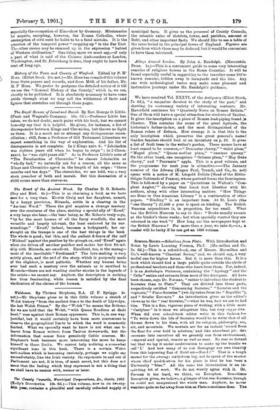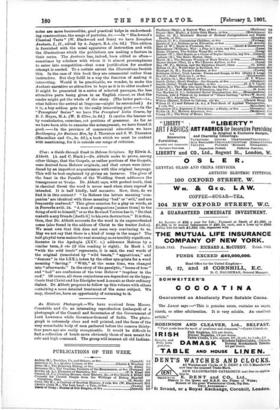ScHooe-BooKs.—Selections from Plato. With Introduction and Notes by Lewis Learning
Forman, Ph.D. (Macmillan and Co. 7s. 6d.)—This is a school-book, one of Messrs. Macmillan and Co.'s well-known "Classical Series," and, we should say, a very useful one for higher forms. But it is more than this. It is a book which should find a large public quite outside the circle of professional teachers and those who learn from them. For, indeed, it is an Anthologia Piatonica, containing the " Apology " and the ' Crito " entire and extracts from most of the dialogues. All have been chosen, says Dr. Forman, " rather to introduce the student to Socrates than to Plato." They are divided into three parts, respectively entitled "Concerning Socrates," "Socrates and the Sophists," " Plato-Socrates " (wholly taken from the " Republic "), and " Briefer Extracts." An introduction gives us the editor's views as to the " real Socrates,"—what be was, how we are to find him. This is a fine, vigorous piece of writing, with a little more " Carlylese in it than we altogether like, but very ruge,e Live. When did ever school-book editor write in this fashion ?- " To write down the life of Socrates would be to write that of all Greece down to his time, with all its religion, philosophy, sea, air, and mountain. We mortals are for an instant struck from the float for ever held in solution,' and like absorbent jell, -fish consume into ourselves all we greedily can from environment, temporal and spatial, remote as well as near. No star so distant but that we lay it under contribution to wake up the bundle we i:all L' And how many of us can disengage our own identity from this inpouring flux of Nicht-ice—Not-I ? " That is a tough morsel for the average sixth-form boy, not to speak of the master whose chief qualification for his place is that he has been a University " blue." All the same the introduction is an in- spiriting bit of work. We do not wholly agree with it. Dr. Forman is too hard, we think, on Xenophon. Sometimes Xenophon gives, we believe, a glimpse of the real Socrates, though he could not comprehend the whole man. Anyhow, he never wanders quite so far away from him as Plato sometimes does. The notes are more businesslike, good practical helps in understand- ing constructions, the usage of particles, &c.—In " Blackwood's Classical Texts" (W. Blackwood and Sons) we have Xenovhon Anabasis, I., II., edited by A. Jagger, B.A. tls. 6d.) This edition is furnished with the usual apparatus of instruction and with the illustrations which the publishers are making a feature in their series. The Anabasis has, indeed, been edited so often— sometimes by scholars with whom it is almost presumptuous to enter into competition—that some justification for another attempt is needed. To a certain extent the illustrations furnish this. In the case of this book they are ornamental rather than instructive. But they fulfil in a way the function of making it interesting. Would it be practicable, we wonder, to make the Anabasis narrative as attractive to boys as it is to older readers ? It might be presented in a series of selected passages, the less attractive parts being given in an English résumé, so that the reader might get the whole of the story. (The latter part—i.e., what follows the arrival at Trapezus—might be retrenched.) As it is, a boy seldom gets to the really interesting part.—In the "Preceptors' Series" we have The Preceptors' Latin Course, by B. J. Hayes, M.A. (W. B. Clive, 2s. 6d.) It carries the learner on by vocabularies, exercises, set portions of grammar. As far as we have been able to examine the arrangement, we have found it good. —In the province of commercial education we have Bookkeeping for Business Men, by J. Thornton and S. W. Thornton (Macmillan and Co., 3s. 6d.), a book which we must be content with mentioning, for it is outside our range of criticism.



































 Previous page
Previous page